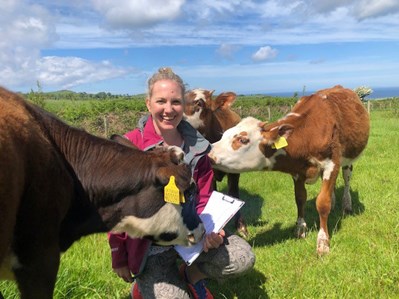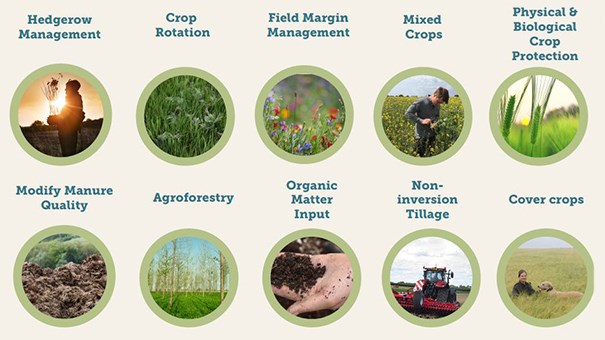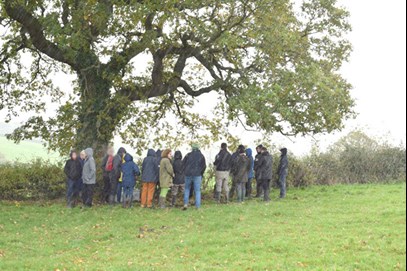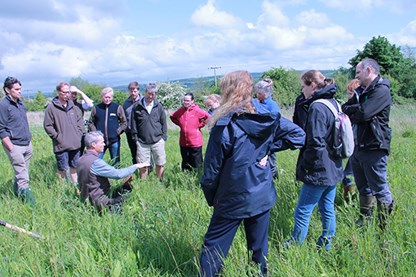FABulous Farmers proves to be a fabulous project
Farming and Land Use team work with all farmers and growers who are interested in understanding and adopting climate- and nature-based solutions.
Since 2019, the Interreg NW FABulous Farmers project (FAB stands for Functional Agro-Biodiversity) has been our ideal vehicle for carrying out this work. Along with National Trust, Centre for Ecology and Hydrology and Farm Carbon Toolkit in the UK, and other partners around Europe, we have been tasked with supporting as many farmers as possible to adopt agroecological farming practices that reduce the need for artificial inputs, improve soil health and increase biodiversity.
As the project draws to a close, we reflect on our key successes and predict the project’s legacy.
1. Creating Learning Networks
Farmers often trust the experiences of other farmers above or alongside research-based information. Coming together as peers around a particular practice or idea in the spirit of ‘show and tell’ adds a level of relatability that can speed up its adoption on-farm.
Devon farmer David Snowden says “You can be quite isolated on a farm, but when you go [to a FAB event], you get the opportunity to chew the fat with other farmers and find out what they're doing”.

Our Farming Advisor Karen Fisher agrees “I'm always amazed when we get groups of farmers together how engaged and passionate they are – including discussing things that have gone wrong. They really learn from each other's experience and knowledge”.
Key achievements
On-farm walks and demonstration events: 500 attendees
Webinars (sometimes replacing in-person events during lockdown): 450 attendees
[several events were co-hosted with Farm Carbon Toolkit]
Agroforestry Learning Networks: Set up in target areas (south west England and Wales) involving some 120 participant who attended regional events and receive a regionally specific quarterly newsletter.
2. Uptake of adoption of key practice
FABulous Farmers supports 10 practices which encourage ways of farming that benefit biodiversity - improving pollination, reducing artificial inputs and improving soil health and water quality on farmland.
We have been particularly focusing on some key practices through our learning networks, and stakeholder and policy work. These are agroforestry, diverse leys and mixed arable cropping, cover crops and reduced tillage.

Hosting events, speaking at conferences, networking, having ‘kitchen table’ talks with individual/small groups of farmers and providing resources, advice and support, our work with FAB helps us spread the word in practical and actionable ways.
We often run events in partnership with like-minded organisations such as the Farming and Wildlife Advisory Group (FWAG), Wildlife Trusts, AHDB, water companies, and the Woodland Trust. In doing so, we have been able to extend our reach, encouraging more farmers, growers and landowners to adopt nature-friendly practices.
Key achievements:
"We will meet our target of 80 farms adopting FAB practices across the project."
Kate Still, head of farming programmes
3. Beyond FAB - legacy
 As a result of our participation in FABulous Farmers, several key activities live on beyond the end of the project.
As a result of our participation in FABulous Farmers, several key activities live on beyond the end of the project.
The Agroforestry Learning Network continues to expand beyond the original target areas and is currently working with over 300 people across the UK.
The Agroforestry Show is the UK’s first and biggest agroforestry event and has support from FABulous Farmers. Taking place in September 23 2023, we are expecting over 1000 visitors and at least 40 sessions. We are anticipating that this will be an annual event going forward.
National events: Under the FAB banner, topics such as herbal leys, min-till, agroforestry, hedgerows and farm woodland management, catch crops and soil health have become the mainstay of our field of expertise at regional and national events such as Groundswell, Oxford Real Farming Conference and Down to Earth. The focus is always kept practical and relevant to on-farm adoption.
 Key stakeholder group meetings: We have organised all-day workshops and follow-up webinars with individuals from key organisations, focussing on two key measures, herbal leys and agroforestry.
Key stakeholder group meetings: We have organised all-day workshops and follow-up webinars with individuals from key organisations, focussing on two key measures, herbal leys and agroforestry.
These groups have come together to discuss the challenges, pinch points and enabling factors that will ease uptake. They have included representatives from Defra, NFU, AHDB, Wildlife Trusts and other environmental and farming NGOs, so between them they hold a great deal of knowledge and influence over what needs to be done. The spirit of cooperation and understanding has been inspiring.
Soil Association Exchange: Piloting of our new online platform to help farmers get the most out of sustainable farming has in part be supported via FAB Farmers. Find out more at Soil Association Exchange.
Citizen science: In 2021, while COVID restrictions were in place, we organised an Easter holiday campaign called Worm Hunt. It encouraged families to look for and count worms in their gardens and accessible public spaces, using our information pack.
Key achievements:
Worm Hunt website page views: 5818
The project has been so successful that it is now part of our annual communications output to citizens.
When COVID restrictions allowed, we were able to get out in-person with some 60 children in small groups.
4. In the media and online
Short films: Support from FAB enabled us to make two films about agroforestry (Agroforestry in the UK and Agroforestry in the Uplands). They have been phenomenally successful, totalling over 106 thousand views.
Our head of programmes Kate Still created a short film Agroecology in Action: FABulous Farmers measure, giving an on-farm whistle stop tour of how and why FAB practices deliver for biodiversity, climate, soil health and the bottom line.
Publications: Articles about FAB-related measures have been published in more than 20 on and offline farmer-facing magazines and periodicals.
We also presented a policy paper to Defra, highlighting the value of FAB measures and how they need to be adopted into the new ELM scheme along the need for advice and peer to peer learning to build the confidence and knowledge to encourage large scale uptake.
Social media – twitter and testimonials: across Soil Association and Innovative Farmer Twitter, Facebook, LinkedIn and Instagram, social media posts have reached over 3.3m people, with 22.9k engagements.
 Find out more:
Find out more:
Find out more about FABulous Farmers, including the project background, measures and regions.

